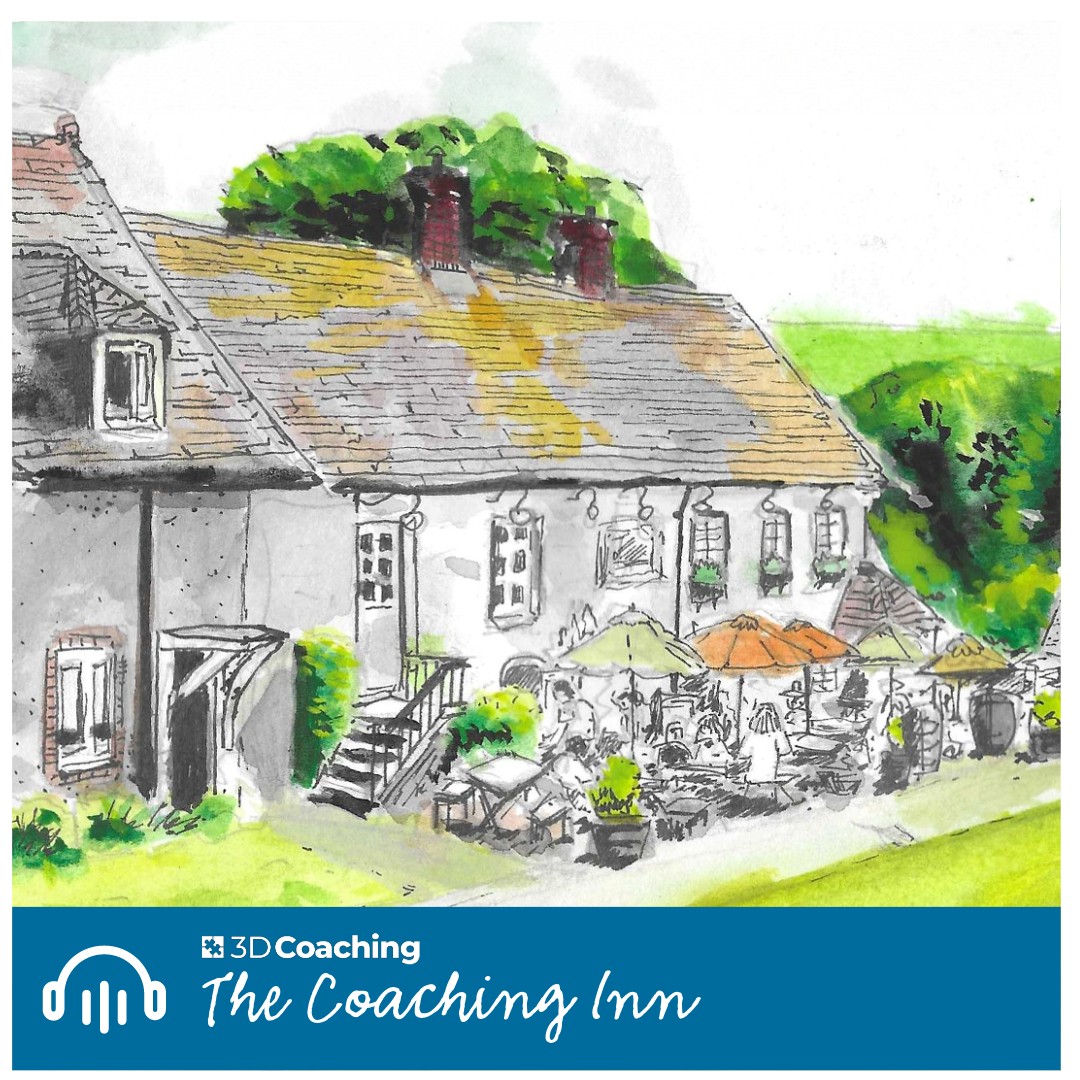
196.6K
Downloads
316
Episodes
Join Claire Pedrick MCC at 3D Coaching’s virtual pub where we have conversations with coaches, authors and thought leaders together with people new to coaching. It’s a cosy chat with a challenging edge. Become a regular by signing up on Apple Podcasts, Spotify or Podbean. Host: Claire Pedrick MCC
Join Claire Pedrick MCC at 3D Coaching’s virtual pub where we have conversations with coaches, authors and thought leaders together with people new to coaching. It’s a cosy chat with a challenging edge. Become a regular by signing up on Apple Podcasts, Spotify or Podbean. Host: Claire Pedrick MCC
Episodes

Wednesday Mar 23, 2022
Wednesday Mar 23, 2022
In another business building episode, Claire Pedrick MCC meets Sarah Short from the Coaching Revolution - where Sarah generously shares some great ideas for aspiring and experienced coaches.
Free Community - Coaching Republic
Find out more about The Coaching Revolution where you can book a call with Sarah
You can buy a hard copy of Sarah's book A Coaching Business in a Book and/or download a free copy of the whole book here (thank you Sarah)
Takeaways
- The success of a coaching business depends on marketing skills as much as coaching skills.
- Niche marketing and ideal client profiles are essential for attracting clients who can and will pay a professional rate for coaching services.
- Coaches should focus on outcomes and the impact of coaching on clients' lives rather than the coaching process itself.
- Building a financially viable coaching business requires a strategic approach to marketing and visibility in the right places where potential clients are present.
Keywords
coaching, coaching revolution, financially viable coaching business, marketing skills, niche marketing, ideal client profiles, coaching process, outcomes, finding clients

Friday Mar 18, 2022
#3DBookGroup Art of Enough - Chapter 3
Friday Mar 18, 2022
Friday Mar 18, 2022
Here’s Becky’s response to your questions and insights from Chapter 3
Next time it's Chapter 4 - Enough Boundaries.
Ask your questions and share observations by commenting on this episode, or emailing info@3dcoaching.com
Keywords
coaching, presence, stress management, breathing techniques, personal development, emotional intelligence, mindfulness, resilience, body awareness, self-regulation

Wednesday Mar 16, 2022
S2 Episode 08: How do you use the Role Question in STOKeRS? (Open Table)
Wednesday Mar 16, 2022
Wednesday Mar 16, 2022
Today Claire is talking with coaches Mark Chappell, Fiona Craig, Caroline Drummond and Catherine Kramer who have all been asking questions about how you answer 'I don't know' questions when you're rightsizing the work at the beginning of every coaching conversation. Especially around the role question - how shall we do this? So we said come to The Coaching Inn and let's talk! We all learned something!
If you have a question about an aspect of coaching where you’d like to dig deeper, let’s talk at The Coaching Inn. Email us through info@3dcoaching.com Thinking about this together out loud will enable other coaches to learn and make their own meaning.
Contact:
- As a coach, it's important to ask the question 'How are we going to do this?' at the beginning of a coaching conversation to set the stage for exploration and partnership.
- It's okay for thinkers to say 'I don't know' in response to questions. It indicates that the work is in uncharted territory and allows for a more open and flexible conversation.
- The role of the coach is to create a safe space for the thinker to explore their thoughts and feelings without feeling pressured to have all the answers.
- Coaches should focus on what is of value to the coachee and be willing to let go of control and follow the thinker's agenda.
- The question 'How will you know we've moved this forward?' is a powerful tool for helping thinkers identify their desired outcomes and measure progress. Set clear expectations about coaching at the beginning of the coaching relationship to avoid mismatched expectations.
- Discuss and address cultural differences upfront when coaching across cultures.
- Avoid providing advice or tips unless specifically requested by the client.
- Regularly check in with clients to ensure the coaching process is on track and meeting their needs.
Keywords
coaching, 'I don't know' questions, right-sizing, role question, exploration, value, flexibility, coaching, expectations, coaching across cultures, clarity, checking in

Wednesday Mar 09, 2022
S2 Episode 07: Holding Space in Coaching with Fiona McBride
Wednesday Mar 09, 2022
Wednesday Mar 09, 2022
Today Claire Pedrick MCC is in conversation with Fiona McBride after reading a blog post that Fiona shared on Twitter about holding space - drawing on her experience as a coach, facilitator and yoga teacher. Listen as we explore presence and silence.
"In silence there is eloquence. Stop weaving and see how the pattern improves" Rumi
Takeaways
- Holding space is about being present with others.
- Presence is an essential skill in coaching.
- Facilitation requires self-awareness and connection.
- Yoga and coaching share similarities in holding space.
- Silence can be powerful in conversations.
- Making offers encourages dialogue and connection.
- People often need permission to slow down.
- Self-reflection is crucial for personal growth.
- Trusting the process is key in facilitation.
- Creating space for connection enhances learning.
Here's Fiona's blog on holding space and the one on crossover
Contact her: hello@fionamcbride.com
Keywords
coaching, holding space, presence, facilitation, yoga, silence, personal growth, connection, communication, mindfulness

Friday Mar 04, 2022
#3DBookGroup Art of Enough Chapter 2
Friday Mar 04, 2022
Friday Mar 04, 2022
Here’s Becky’s response to your questions and insights from Chapter 2
Next time it's Chapter 3 - Enough Presence.
Ask your questions and share observations by commenting on this episode, or emailing info@3dcoaching.com
Keywords
coaching, self-actualization, beliefs, values, personal growth, enough permission, cultural contexts, leadership, limiting beliefs, self-awareness

Wednesday Mar 02, 2022
S2 Episode 06: Power and Privilege in Coaching with Liz Price
Wednesday Mar 02, 2022
Wednesday Mar 02, 2022
Today Claire Pedrick MCC is in conversation with coach Liz Price ACC. Several weeks ago, Liz started a conversation about power and privilege and difference after she and colleagues piloted a group to read and dig deep into their own power and privilege through reading Me and White Supremacy by Layla Saad. Acknowledging power and difference is an important part of an ethical stance in coaching. We will be exploring this through different lenses at The Coaching Inn this year.
Contact Liz via Linked In
Key Words
coaching, power, privilege, partnership, vulnerability, accountability, group dynamics, personal growth, coaching relationships, diversity

Wednesday Feb 23, 2022
S2 Episode 05: The IDEA Mindset with Gary Crotaz
Wednesday Feb 23, 2022
Wednesday Feb 23, 2022
Claire Pedrick MCC and Gary Crotaz ACC in conversation about mastery, aspiration, and Gary's new career change book The IDEA Mindset.
Takeaways
- Direction is crucial for making career decisions.
- You can coach yourself effectively with the right tools.
- Surrounding yourself with better people fosters growth.
- The journey of finding your vocation is ongoing.
- Teamwork is essential in achieving goals.
- Self-awareness is key to personal development.
- The dance world teaches resilience and adaptability.
- Changing your title can shift others' perceptions.
- Good things happen when you focus on doing good.
Contact Gary gary@garycrotaz.com
Keywords
coaching, career development, The Idea Mindset, personal growth, vocational journey, ballroom dancing, self-coaching, professional development, direction, teamwork

Friday Feb 18, 2022
#3DBookGroup - Art of Enough - Chapter 1
Friday Feb 18, 2022
Friday Feb 18, 2022
Here’s Becky’s response to your questions and insights from Chapter 1 of the Art of Enough
#3DBookGroup
Next time it's Chapter 2 - Enough Permission.
Ask your questions and share observations by commenting on this episode, or emailing info@3dcoaching.com
Keywords
coaching, enough mindset, self-connection, scarcity culture, personal growth, abundance, gratitude, flourishing, 3D Coaching, Becky Hall

Wednesday Feb 16, 2022
S2 Episode 04 Why weren't we taught this at school? with Alice Sheldon
Wednesday Feb 16, 2022
Wednesday Feb 16, 2022
Claire Pedrick MCC and Alice Sheldon in conversation about conversations and Alice's book: Why weren't we taught THIS at school - the surprisingly simple secret to transforming life's challenges.
Drawing on the work of Marshall Rosenburg's Non Violent Communication, Alice's work is all about having better conversations!
Takeaways
- Alice's book addresses the gap in education about human needs.
- The writing process can be collaborative and not solitary.
- Understanding needs can lead to better empathy and solutions.
- Values conflicts in organizations can be deeply personal.
- Parenting triggers can reveal our own unmet needs.
- Family of origin influences our emotional responses.
- Coaching can benefit from understanding needs frameworks.
- Compassionate leadership can change organizational culture.
- Mediating conflict requires understanding underlying needs.
- Practical tools can empower individuals to create change.
Contact Alice via Linked In
or http://www.needs-understanding.com/
Keywords
coaching, human needs, parenting, conflict resolution, values, organizational change, empathy, collaboration, personal development, leadership

Wednesday Feb 09, 2022
S2 Episode 03: Coaching in Education with Steve Bush and Tony Swainston
Wednesday Feb 09, 2022
Wednesday Feb 09, 2022
Steve tweeted @3dclaire after she shared the interview with Nick Bolton about what coaching really is. So we said come to The Coaching Inn and let's talk.
It turns out that Steve Bush is a teacher using coaching in education, and Tony Swainston trains coaches in education (and is the author of Outstanding Coaching in Schools). Join them as they talk about coaching, education, tools and techniques.
Steve Bush Twitter @stevebushfcct
Tony Swainston tony@tonyswainston.com
Key Words
coaching, education, metacognition, leadership, dialogue, coaching tools, coaching young people, coaching journeys, coaching impact
